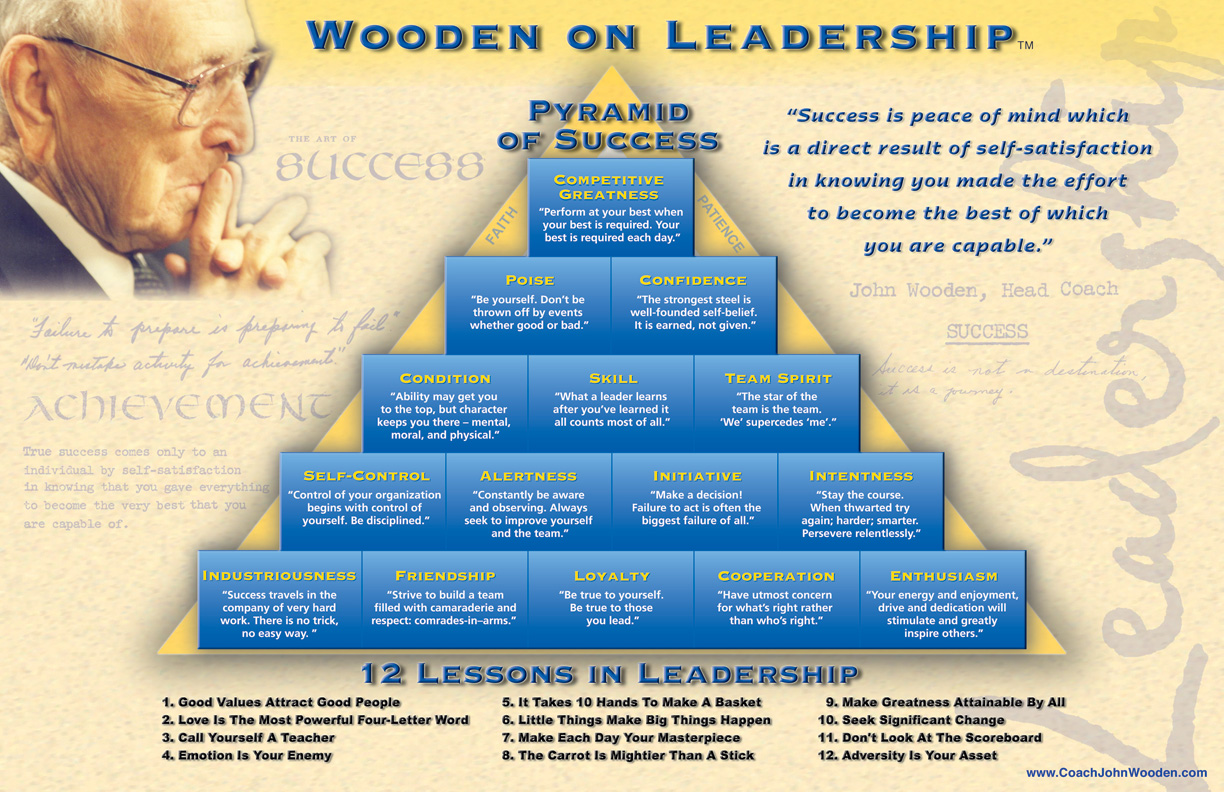Lessons from Coach John Wooden
Recently Cincom Founder and CEO Tim Nies published an article titled “Rhythm and Tempo Must Be Orchestrated by the Maestro.” He draws the parallels to Maestros controlling the rhythm, metre and tempo of a symphonic performance to that of an excellent selling professional who seeks to excel at value-based selling in complex selling cycles. He points out that for sales cycles to be successful, each person and department contributing to their success needs to be synchronized with each other. Knowing when to jump at an opportunity with total intensity and passion versus when to pull back and use time wisely is a key point of the article.
His many points made me stop and think of the best examples of leaders controlling the rhythm, metre and pace of their teams to their goals. Coach John Wooden of UCLA immediately came to mind.
With a career record of 664-162 (.804), 10 NCAA National Championships, 13 trips to the Final Four and a member of the inaugural class of inductees for the College Basketball Hall of Fame in 2006, Coach Wooden exemplifies what being a Maestro is all about.
No other collegiate coach has won this many national champions in the history of NCAA basketball. Consider the players he orchestrated through their collegiate careers, including Bill Walton, Gail Goodrich, Kareem Abdul-Jabbar, Kevin Grevey and many others.
Complex Selling Cycles and Basketball Seasons: Both Need Values to Succeed
Sales professionals who sell on value are a lot like Coach Wooden. They orchestrate their teams to align with the most urgent needs of prospects, capitalize on opportunities to excel and compete more often against themselves than letting a sales cycle degenerate into a price war. When entire companies choose to sell on value, just as when entire basketball programs do, they improve over a season. The same dynamic happens in complex selling cycles. Being more focused on using time competitively is what also differentiates winning sales cycles and winning basketball teams.
Respect and value for time must anchor any long-term selling effort, the same way a coach will look to the hours invested in practice to make their team the strongest, fastest, and smartest it can be. Being a Maestro or coach also requires that a new perception of time be communicated to everyone involved in a sales cycle or team, and it is this: competitive strength comes from how time is used and invested, not in the size or financial might of a competitor. Coach Wooden could attest to this.
Managing Time Is the Greatest Competitive Strength
UCLA’s first national championship under Coach Wooden came 1964 against Duke, a basketball powerhouse and a financially stronger school than UCLA at the time. Coach Wooden came into that national championship with a perfect 30-0 record. How? From exceptional recruiting? UCLA was relatively unknown for basketball to this point. Exceptional alumni donations? The UCLA basketball budget in 1964 was less than many pay for a new car in 2010. It was valuing time and making the most of it, time used well was the great equalizer, the competitive strength UCLA used to win their first national championship and nine more.
Just as any sales professional knows who has managed and won complex selling cycles, the competitor who manages their time the most effectively has a greater chance of winning. Everyone competing in a complex sales cycles has to wake up every day and resolve to be more efficient, more focused, stronger with solutions for the prospect than their competitor – and when this mindset is achieved complex selling cycles are won.
Seeing Time as a Competitive Asset First, Constraint Second
A great coach can control the rhythm, metre and pace of a game their team is competing in. The same holds true for sales professionals who sell on value when they are managing complex selling cycles. A common trait both have – and it is essential to control rhythm, metre and pace – is seeing time not in fear but as a competitive strength to be gained by using it well. Coach Wooden at times quoted verses to his players including Ecclesiastes 9:11, The race is not to the swift or the battle to the strong, nor does food come to the wise or wealth to the brilliant or favor to the learned; but time and chance happen to them all. In other words, everyone has the same amount of time; it’s up to each of us – selling or supporting the selling cycle – how we’re going to use it.
Wooden’s Competitive Secret: Strong Values Lead to Championships
Just as a Maestro conducts a symphony comprised of widely varying instruments, so too a sales professional orchestrates selling teams that each have their unique strengths used in the service of customers. What unifies an orchestra or symphony and the highest performing sales teams are their shared values.
Coach John Wooden began work on the Wooden Pyramid of Success, shown below and downloadable in PDF format here, over his years of coaching first at Indiana State and through the years at UCLA. Take a moment and read over the Pyramid of Success and reflect on the highest performing sales teams you’ve ever worked with. If your experiences are like mine, you can readily attest to a very large overlap. The best salespeople who sell on value are teachers; they genuinely love to serve their customers. Indeed some see it as a calling to be of service to customers and have a passion for it. Best of all, the Wooden Pyramid of Success succinctly communicates what great teams exemplify and that is a selflessness of service and a willingness to give complete intensity and focus to winning.
Bottom line:
Complex selling cycles are as long or longer than a basketball season.
Anchoring the coordinated efforts of teams in shared values and treating time not with fear but with an opportunistic mindset makes all the difference. From the Maestro who delivers an excellent performance to Coach Wooden winning 10 NCAA National Championships, to the sales professionals who sell on value and orchestrate their teams to winning new business, all must be anchored in solid, strong values to succeed.
Courtesy – Louis Columbus
Louis Columbus has nearly 20 years of experience in the IT industry, specializing in market and industry analysis, sales, product management and development. He's held senior positions at Toshiba America, Lockheed-Martin, Intergraph, and immediately before joining Cincom, as senior analyst at AMR Research. Mr. Columbus is a frequent contributor to industry publications, is a columnist for CRMBuyer.com, and has published 15 books on operating systems, peripherals, and industry analysis. In addition, Mr. Columbus is a frequent lecturer in Webster Loyola-Marymount University's graduate program on International Business. He is a regular contributor to the Perfect Customer Experience and the Complex Selling Made Simple blogs. Contact Information: LColumbus@Cincom.comAbout the Author




0 comments:
Post a Comment